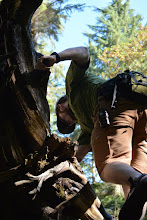I wrote this in response to a comment, but it's a pretty massive reply, and an important topic, so it gets its own post. I hope nobody thinks I'm some kind of expert on this kind of stuff.
Anyway, here it is, nearly quoted from the reply.
------------------------------------------
The art for you for self-defense is any art that fits you. The reason for this is that even the perfect art, if you don't like it, won't help you because you will quit studying if it's no fun. Most dojo will let you try for a month, and often for free. I would recommend trying any art for about two months before you try to make a decision on it.
Now, that said, there are some fairly simple things to keep in mind when choosing a martial art for self-defense.
Basic way: The question here is "Hard or soft?"
Hard styles use a lot of striking attacks - punches, kicks, elbow strikes, and soforth. Examples: karatedo, tae kwon do.
Soft styles emphasize blending with the enemy and utilizing their weight and power against them. Examples are judo, aikido, jujutsu,
In my opinion, soft styles take much more training to become equally proficient in when compared to hard styles.
Your body: Judo is theoretically all about using your opponent's weight against him and blah, blah, blah.
If it were really that simple, there wouldn't be ten weight divisions in competitions and I wouldn't be able to keep up with my dojo's captain when we're doing ground techniques. So if you've got a small frame, judo is probably not the best option. That said, I feel everyone should have some practice with groundfighting, as something like 80% of fights go to the ground eventually.
Hell, you never know when groundfighting practice could come in handy. "Passing the guard" could be convenient of your partner isn't particularly flexible or your bed is a little small... Am I still talking about martial arts?As a beginner, your weight and physical stature have a great effect on what you can do. As you progress, they begin to matter less and less, and I'd point at Keri Erikson as a perfect example of this, deadly little fighting machine with massive glasses that she is.
Focus: Some dojo train their students for competitions, some train just for self-defense, and some do a little of both. You can usually identify real-life self-defense stuff by how strange it is. That is to say that anything that's likely going to be useful in a real self defense situation will likely be a little silly or embarassing the first time you do it.
Convenience: As silly as this sounds, it's a pretty big factor. The most important thing about a martial art is simply that you enjoy practicing it, and that you will keep practicing for at least a few years.
As an example, if you have to travel an hour to get to your dojo, you're more likely to make excuses to yourself to skip classes.
To some up: convenience of study, your body type, dojo goals, and preferred way of doing things are all important things to keep in mind when choosing a dojo and a style.
To get to the point, already: Ignoring everything above, my personal recommendations for fighting arts to learn for the purpose of self-defense are, again,
hapkido (semi-AKA "combat aikido"), many of the popular arts (tae kwon do, karatedo, kung fu, etc), and - actually, this would be my preference, though I've never practiced any - pretty much any Philipino martial art (ex: escrima and silat).
Now, you might be able to avoid this altogether and simply take a self-defense class. Any decent-sized city will have women's self defense classes being taught in them, probably once a month. The most important part is that you do whatever it is
a lot, as the effectiveness of any technique comes from its execution.
Important: Even if you don't study a martial art or anything, please bear in mind that the statistics show that in the event of attempted rape (and probably kidnapping, too), people who resist violently are the least likely to become victims.
The important part is to make yourself be more work than it's worth; kick, scratch, claw, slap, scream - it doesn't matter, as long you're physically and verbally resisting, you're much more likely to come out both alive
and unraped.
Labels: martial arts








































